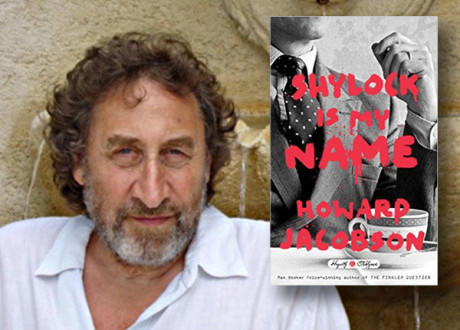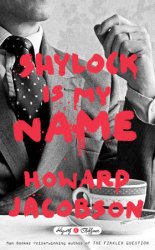On the stage of the Folger Theatre, with the vestiges of the set of Aaron Posner’s just-closed Midsummer Night’s Dream in the background, well-known director and playwright Aaron Posner and Man Booker prize-winning author Howard Jacobson summoned a ghost on Monday night. That ghost was the spirit of the controversial and ever-fascinating Shylock of Shakespeare’s The Merchant of Venice.

Jacobson read from his provocative new book Shylock is My Name, a contemporary retelling of Shakespeare’s The Merchant of Venice. Shylock is My Name is the second in a Hogarth Press series of novels inspired by Shakespeare and written by best-selling novelists. Other selections include Vinegar Girl, a modernization of The Taming of the Shrew by Anne Tyler, and Hamlet as re-imagined by Gillian Flynn, author of Gone Girl. Posner’s version of the play, District Merchants, opens at the Folger in May.
Posner and Jacobson discussed Jacobson’s early love for Shakespeare. “I loved it as a schoolboy,” Jacobson said. “This is where language comes from….I heard the words in my head from a very early age….I can’t write without hearing Shakespeare.”
“Do you hear it as you write?” asked Posner. “I hear it as I write,” Jacobson replied.“I am a great admirer of Dickens reading his own work. Another of my books, The Mighty Walzer, is being turned into a play by a very good company in Manchester.” Jacobson noted that when he attempts to write a play he starts to think it should be poetic. Posner joked, “I hear there are some quite good plays not written in verse.”

Jacobson described his embarrassment upon being told by a teacher when the class was reading Merchant, “You can be Shylock.” “Hath not a Jew eyes?” he said, seemed like a kind of special pleading. Although rhapsodic on the subject of Shakespeare’s poetry, Jacobson was less admiring of Shakespeare’s stories. While saying that they “bubble up from the rich English past Shakespeare draws on”, he had less kind words for the casket scene. “What schmuck would choose the gold box?” he asked.
Jacobson also observed that unlike Malvolio in Shakespeare’s Twelfth Night, Shylock never gets the chance to say “I’ll be revenged on the whole pack of you!” Posner agreed that certain aspects of the mocking of Malvolio are a “broken place” in the play.
Jacobson offered us a new Shylock; not old and plodding, but witty, quick, sardonic. He emphasized Shylock’s love for his wife Leah and the pain his betrayal by daughter Jessica causes. When Jessica exchanges Leah’s ring for a monkey, Jacobson remarked on the deep emotion contained in Shylock’s response upon hearing the news. “I had it of Leah, when I was a bachelor. I would not have given it for a wilderness of monkeys.”
The cynical world of Portia and Antonio, according to Jacobson, is one where love is bartered. In his novel, Belmont becomes South Manchester, where there is an abundance of new money, where footballers and popstars live and give their children absurd names.

One brave audience member raised the question of whether Shakespeare’s Merchant is anti-Semitic. Jacobson mentioned the medieval notion of the Jew who denied Christ, but avers that the play humanizes Shylock as the object of racism rather than “heroizing” him.
It was an illuminating evening, offering new insight into the character, his pain, his love for his wife, and his razor-sharp wit. Many audience members bought the novel and lined up to have it signed.
And of course, in addition to reading Shylock is My Name, we can look forward to Posner’s District Merchants at the Folger which opens May 21st.






Thanks to Howes’ column, reading “Shylock is my name “and seeing “District Merchants” will be on many to-do lists for this spring. Not only is she a major-league advocate for the Bard and the Folgers, Howes assures her readers that Shakespeare’s art is accessible and available for everyone.